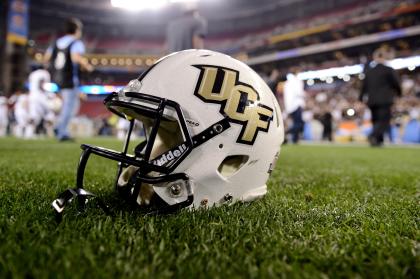UCF makes its case to Big 12, but could be on outside looking in

The University of Central Florida presented its case for inclusion in an expanded Big 12 last month, but it could find itself on the outside looking in among candidates to potentially join the league.
ESPN.com’s Jake Trotter reported Monday that UCF president John Hitt, in a May 17 letter sent to Oklahoma State president Burns Hargis (Update: 6/7 - SB Nation has published the letter in full), highlighted the Orlando, Florida, market while comparing UCF to Cincinnati and UConn, two other Big 12 expansion candidates, in an effort to build up the school’s candidacy.
The league’s presidents and athletic directors met in Texas last week to discuss expansion, among other things (like the reintroduction of a championship game), and commissioner Bob Bowlsby told reporters a vote could come by the end of the summer.
[Check out Dr. Saturday on Tumblr for entertaining things you won’t see on the blog]
Like others before it, UCF made sure it was part of the discussion and consulted with an economic analysis firm to produce a report endorsing the school’s resume relative to its AAC counterparts (which UCF perhaps saw as its biggest competition?).
With the letter, Hill also included a report the school commissioned to compare the candidacy of UCF to fellow Big 12 expansion candidates UConn and Cincinnati.
The report, conducted by a Tallahassee, Florida-based economic analysis firm and titled "University of Central Florida in the Big 12," claimed that Orlando's population growth is expected to be six times greater than Cincinnati's and 500 times greater than the region of Hartford, Connecticut, over the next 10 years.
The report also stated that Orlando trumps Cincinnati and Hartford in employment and income, concluding that "Orlando has proven that it is capable of attracting and sustaining economic growth, making it an ideal candidate for joining the Big 12 Conference."
Hitt also claimed the school could expand Bright House Networks Stadium from a 45,000-seat capacity up to 65,000.
All of that is well and good, but without a Big 12 television network, what would that touted Orlando market really bring to the conference, anyway?
[Visit Dr. Saturday on Facebook for stories you might have missed and chat with the writers]
That news – that, as Oklahoma president David Boren put it, the “boat had sailed” on the chance to create a network – was overshadowed by the league’s decision to bring back a title game in 2017. The television network question has been hanging over the expansion rumblings. Boren, who has been perhaps the biggest advocate for expansion among conference officials, admitted as much. And that decreased emphasis on television could be bad news on the expansion front for UCF. USF, too.
Boren had acknowledged in the past that his push for a network had been one of the biggest drivers behind expansion. With only 10 schools and limited markets in the status quo, expansion was viewed as a prerequisite for getting a network off the ground. And not just any expansion, but expansion into large markets to help build a substantial subscriber base that would make a network financially viable.
Perhaps above anything else, that made UCF and USF attractive, with the two schools residing in two of the top 15 television markets in the country.
That places the emphasis back on bringing in programs with the best football pedigree, right? As ESPN.com pointed out, bringing in TCU and West Virginia didn’t really move the needle in the world of television, but it beefed up the level of competition in the league on the field. The loyal fanbases of those programs certainly helped their candidacy, too.
"Yes, TV markets are important. Yes, the financial aspect is important," Boren said per ESPN.com. "But ... our fans want to see our teams play against great teams. They don't want to see them play mediocre teams. We have to determine what that's going to do to the longtime reputation of the brands at each of the schools and what quality of opponents we're having."
So which schools make the most sense? ESPN.com pointed to BYU (10 straight winning seasons) and geographically-friendly Houston (coming off a 13-1 season, but traditionally mediocre). How about Boise State? Cincinnati maybe?
UCF, for the record, won at least 10 games three times this decade, but last year's 0-12 blemish won't exactly help its cause (though the hire of Scott Frost looks like a good one).
Of course, the league doesn’t have to expand. But if it does, the checklist for candidates appears to be a bit different now.
For more UCF news, visit UCFSports.com.
- - - - - - -
Sam Cooper is a writer for the Yahoo Sports blogs. Have a tip? Email him or follow him on Twitter!

